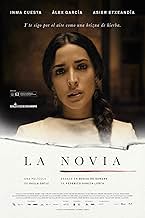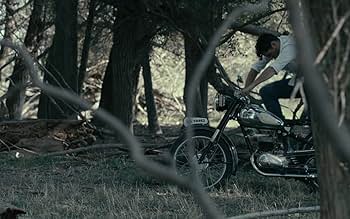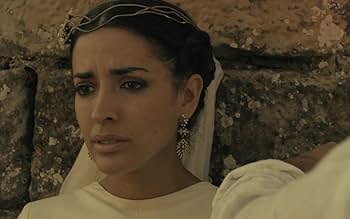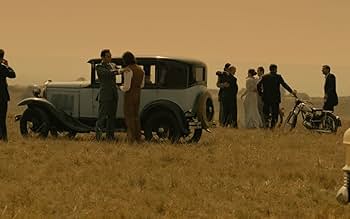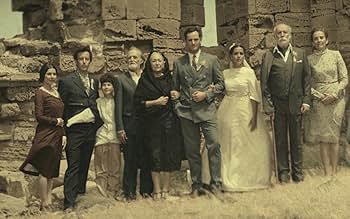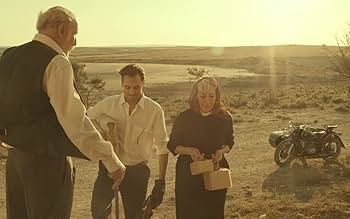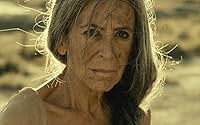NOTE IMDb
6,6/10
3,6 k
MA NOTE
Un conte tragique de désirs inassouvis et d'envies interdites, de choix conflictuels, de tromperie et de fatalité, vécu par trois amants impuissants devant la véritable nature de l'être huma... Tout lireUn conte tragique de désirs inassouvis et d'envies interdites, de choix conflictuels, de tromperie et de fatalité, vécu par trois amants impuissants devant la véritable nature de l'être humain.Un conte tragique de désirs inassouvis et d'envies interdites, de choix conflictuels, de tromperie et de fatalité, vécu par trois amants impuissants devant la véritable nature de l'être humain.
- Réalisation
- Scénario
- Casting principal
- Récompenses
- 19 victoires et 34 nominations au total
Carmela Labordeta
- Novia Joven
- (as Carmela del Campo)
Avis à la une
Visually stunning and emotionally charged Spanish drama that delves into the complexities of love and passion.
First and foremost, Inma Cuesta's performance as the eponymous "Novia" (Bride) is captivating. She portrays the character's emotional turmoil and inner conflict with remarkable depth and vulnerability.
The film's cinematography is a standout feature, capturing the rugged and breathtaking landscapes of rural Spain. The visual storytelling adds an extra layer of beauty to the narrative.
La Novia explores themes of forbidden love, loyalty, and the consequences of past decisions. It weaves a tale of passion and tragedy, leaving a lasting impact on the viewer.
The emotional intensity of the film is heightened by a haunting musical score that perfectly complements the story's dramatic beats.
The supporting cast, including Álex García and Asier Etxeandia, deliver solid performances, adding depth to the complex web of relationships.
However, some viewers may find the film's pacing slow, as it takes its time to delve into the intricacies of the characters' emotions and relationships.
In conclusion, La Novia is a visually striking and emotionally charged drama that immerses viewers in a world of passion and heartache. With Inma Cuesta's compelling performance, the stunning cinematography, and the film's exploration of forbidden love, it's a cinematic experience that leaves a lasting impression.
If you appreciate atmospheric and emotionally-driven films with a touch of romance, La Novia is a must-watch. It's a poignant and visually captivating journey into the complexities of human relationships and the power of love.
First and foremost, Inma Cuesta's performance as the eponymous "Novia" (Bride) is captivating. She portrays the character's emotional turmoil and inner conflict with remarkable depth and vulnerability.
The film's cinematography is a standout feature, capturing the rugged and breathtaking landscapes of rural Spain. The visual storytelling adds an extra layer of beauty to the narrative.
La Novia explores themes of forbidden love, loyalty, and the consequences of past decisions. It weaves a tale of passion and tragedy, leaving a lasting impact on the viewer.
The emotional intensity of the film is heightened by a haunting musical score that perfectly complements the story's dramatic beats.
The supporting cast, including Álex García and Asier Etxeandia, deliver solid performances, adding depth to the complex web of relationships.
However, some viewers may find the film's pacing slow, as it takes its time to delve into the intricacies of the characters' emotions and relationships.
In conclusion, La Novia is a visually striking and emotionally charged drama that immerses viewers in a world of passion and heartache. With Inma Cuesta's compelling performance, the stunning cinematography, and the film's exploration of forbidden love, it's a cinematic experience that leaves a lasting impression.
If you appreciate atmospheric and emotionally-driven films with a touch of romance, La Novia is a must-watch. It's a poignant and visually captivating journey into the complexities of human relationships and the power of love.
"At the heart of all great art is an essential melancholy", Spanish dramatist Federico Garcia Lorca's own words which also aptly describe La Novia, a new filmic adaptation by Paula Ortiz of his 1932 play, Bodas de Sangre (Blood Wedding), a tragedy which details a bride's indecision when she is torn between her newly-wedded husband, and her lover. I went to see this film at a Spanish cinema in Cadiz this week with friends, and I was not at all disappointed. Although I have never studied this particular play, I am quite familiar with Lorca's other work, having analysed his Romancero Gitano (Gypsy Poetry) at University and his equally influential play, La Casa de Bernarda Alba (The House of Bernarda Alba), at Grammar School. Throughout his work, Lorca's sympathy is always with the lower classes, from which come his protagonists. Lorca's own story is an interesting and melancholic one, coming from a wealthy farming background in Andalucia, and growing to dislike his status of wealth, and identifying instead with the lowly.
Not only was Lorca troubled by his own social identity, he was also homosexual, which, you will see, adds another dimension to his written work and which, along with his status as a political dissident in the Spanish Civil War, led to his brutal assassination at the hands of the Civil Guard. I digress... La Novia is a beautiful film which makes wonderful use of long shots to capture the warm, bare, aridity of Spanish countryside, almost a metaphor for death and devastation which the transgression brings in the story. It was, I imagine, almost a given that this film would win this year's Goya Award for Cinematography, with thanks to Miguel Amoedo. For the average film-goer, the plentiful, expressive shots may lag, and may be seen as "art for art's sake". All the same, one cannot deny the awe they inspire. In terms of the acting, Inma Cuesta is wonderful in the part of the bride, and often looks strikingly like a young Penelope Cruz. Equally great are the bride's love interests; Asier Etxeandia, who plays the husband; and Alex Garcia, who plays Leonardo, the lover. Spanish film aficionados will also be able to recall Luisa Gavasa, a stalwart of Spanish cinema, who stuns with her performance as the husband's mother - a character beset with horrific premonitions of a disastrous marriage. The music, by Shigeru Umebayashi, is also stirring.
Lorca also said in his lifetime that "In Spain, the dead are more alive than the dead of any other country in the world." This new (filmic) lease of "life" for Lorca is clear proof of this statement. As I have already seen, Spain is a country which refuses to forget its past, literary, filmic, or otherwise.
Not only was Lorca troubled by his own social identity, he was also homosexual, which, you will see, adds another dimension to his written work and which, along with his status as a political dissident in the Spanish Civil War, led to his brutal assassination at the hands of the Civil Guard. I digress... La Novia is a beautiful film which makes wonderful use of long shots to capture the warm, bare, aridity of Spanish countryside, almost a metaphor for death and devastation which the transgression brings in the story. It was, I imagine, almost a given that this film would win this year's Goya Award for Cinematography, with thanks to Miguel Amoedo. For the average film-goer, the plentiful, expressive shots may lag, and may be seen as "art for art's sake". All the same, one cannot deny the awe they inspire. In terms of the acting, Inma Cuesta is wonderful in the part of the bride, and often looks strikingly like a young Penelope Cruz. Equally great are the bride's love interests; Asier Etxeandia, who plays the husband; and Alex Garcia, who plays Leonardo, the lover. Spanish film aficionados will also be able to recall Luisa Gavasa, a stalwart of Spanish cinema, who stuns with her performance as the husband's mother - a character beset with horrific premonitions of a disastrous marriage. The music, by Shigeru Umebayashi, is also stirring.
Lorca also said in his lifetime that "In Spain, the dead are more alive than the dead of any other country in the world." This new (filmic) lease of "life" for Lorca is clear proof of this statement. As I have already seen, Spain is a country which refuses to forget its past, literary, filmic, or otherwise.
This movie is a wonderful representation of Lorca's work and imagery. Full of metaphors, great music, and scenes.
in many senses. not all easy to seduce. slow motion cinematography, landscapes from Capadoccia, poetic images, admirable presence of Maria Alfonsa Rosso and Garcia Lorca play atmosphere. a film who must admire ignoring the story because the first scenes are enough for know the evolution of the relations between characters to the tragic end. and the accuracy to the play is sacrificed for the noble desire to give an art film. result - "La novia" is one of films for a reduced target. a public who discovers more than the good intentions of the director or the changes by the play. a public seduced by atmosphere. by poetry of image. by the similarities with other tragic love stories. a film seduced by costumes and air and broken glass and costumes and old earrings. nostalgia. and justice.
The film crew has shot a poem rather than a movie. You would either love or hate this piece; there is most probably no middle ground. I am personally in the former camp. The story itself is as familiar as an ancient Greek tragedy: namely, the sinfully intense love and the revengeful fate. The images are so captivating that makes you feel the characters exist out of space-time. This is highlighted when the heroin encounters "herself" more than a few times throughout the film. If you love poetry in images, then you will not easily forget the beautiful scenes and that primordial sadness arising from the unavoidable fate.
Le saviez-vous
- AnecdotesDirector Paula Ortiz cares immensely about the artistry of the shots and takes, that's why the cast usually had to act through adverse or unpleasant environment conditions. For example, the scene when the bride sings "la Tarara" was filmed in the middle of the desert of Los Monegros at 5 a.m. Actors also had to deal with strong wind (cierzo), blinding light or mosquitoes, or even against the clock filming when the scenes happened at sunset.
- GaffesThe groom chases the unfaithful bride on a BMW R25/2, formerly seen in the film with a sidecar. When he arrives, he rides an unidentified motorcycle (could it be a BSA?) which stalls.
Meilleurs choix
Connectez-vous pour évaluer et suivre la liste de favoris afin de recevoir des recommandations personnalisées
- How long is The Bride?Alimenté par Alexa
Détails
- Date de sortie
- Pays d’origine
- Site officiel
- Langue
- Aussi connu sous le nom de
- The Bride
- Lieux de tournage
- Sociétés de production
- Voir plus de crédits d'entreprise sur IMDbPro
Box-office
- Budget
- 1 187 147 € (estimé)
- Montant brut mondial
- 1 779 966 $US
- Durée
- 1h 36min(96 min)
- Couleur
Contribuer à cette page
Suggérer une modification ou ajouter du contenu manquant

![Regarder Tráiler [OV]](https://m.media-amazon.com/images/M/MV5BMzg3YWM0YjAtNDg2ZC00ZGE0LWJhYzMtNzg3NjBmYTcxY2FhXkEyXkFqcGdeQXRyYW5zY29kZS13b3JrZmxvdw@@._V1_QL75_UX500_CR0)
![Teaser Tráiler [OV]](https://m.media-amazon.com/images/M/MV5BNTVjMzNlNGEtMDNhNi00MGY1LTgxNzUtZDc3YjA2NGUyODE0XkEyXkFqcGdeQXRyYW5zY29kZS13b3JrZmxvdw@@._V1_QL75_UX500_CR0)
